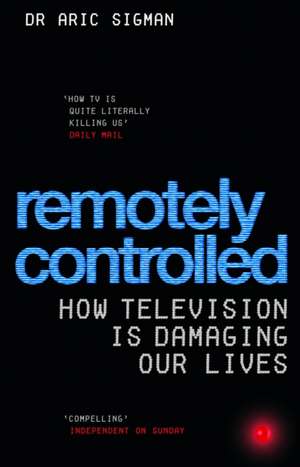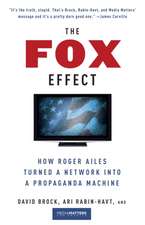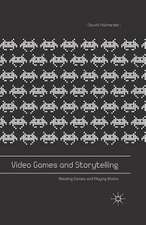Remotely Controlled
Autor Aric Sigmanen Limba Engleză Paperback – 31 ian 2007
More than an indictment of the dangers of watching too much television, Remotely Controlled draws attention to the glaring imbalances in our lives and shows us how exposure to greenery can counter the harmful effects of the screen.
Preț: 100.42 lei
Nou
Puncte Express: 151
Preț estimativ în valută:
19.22€ • 20.87$ • 16.14£
19.22€ • 20.87$ • 16.14£
Carte disponibilă
Livrare economică 01-15 aprilie
Livrare express 15-21 martie pentru 20.07 lei
Preluare comenzi: 021 569.72.76
Specificații
ISBN-13: 9780091906900
ISBN-10: 0091906903
Pagini: 356
Dimensiuni: 139 x 196 x 23 mm
Greutate: 0.25 kg
Editura: VERMILLION
Locul publicării:United Kingdom
ISBN-10: 0091906903
Pagini: 356
Dimensiuni: 139 x 196 x 23 mm
Greutate: 0.25 kg
Editura: VERMILLION
Locul publicării:United Kingdom
Extras
One
Arrested Developments
What Television is Doing to our Children's Brains
From organic baby foods and factor 30 child sun creams to educational toys, good parenting is now treated as a fine science. Even the practice of smacking has undergone rigorous re-examination and attracted tremendous concern from Her Majesty's Government. What is conspicuous by its absence, however, is any mention of television as a major health and developmental issue. In its latest White Paper, proposing radical measures to improve the health of the nation, the British Government whitewashes the role of television into oblivion. The normally more progressive American government is curiously even muter on the subject. We should take note of a few names for future reference when it's time to apportion blame. Given the mounting credible evidence that television damages children, the Government's role is nothing short of a motivated negligence.
The link between watching television and physical and psychological damage is neither a concoction nor an exaggeration. Rather, the reverse. Highly respected medical bodies have voiced clear concerns, and the normally conservative mainstream medical and scientific journals have published worrying associations between television viewing and health. In surveying the response by politicians and the media to this evidence, Peter Preston, former Editor of The Guardian newspaper, wrote, 'It is, all things considered, a scandal of cowardly silence.'
The Link between TV and ADHD
In August 1999, the American Academy of Pediatrics (AAP) issued guidelines clearly recommending that children under the age of two watch no television or any screen entertainment at all, and that children of all ages should never have a television in their bedroom because television 'can negatively affect early brain development'.
This startling announcement has just been added to by the latest study of 2,500 children published in their medical journal, Pediatrics. About seven per cent of our children now suffer from attention deficit hyperactivity disorder (ADHD), and the rate of this neurological disorder appears to be increasing. In the United States, it is now the most common behavioural disorder in children. Although genetic inheritance accounts for some of the prevalence of ADHD, and despite decades of research, little thought has gone in to the potentially crucial role that early childhood experiences may have on the development of attentional problems. The authors of the study wondered if there is an omnipresent environmental agent that is putting children at risk of developing ADHD. Critics have wrongly argued that ADHD is a convenient label that simply medicalises the behaviour of difficult American children for the benefit of exasperated parents, teachers and pharmaceutical companies, and that Ritalin is a profitable 'chemical cosh'. Yet new research at London's Institute of Psychiatry concludes that ADHD is a real problem, and brain-imaging evidence shows it has a biological basis. The parts of the brain that we use for controlling our impulses are found to be underactive. Moreover, 10 years later, boys with ADHD are four times more likely to have developed mental illness.
The authors of the study in Pediatrics believe that '...early exposure to television during critical periods of synaptic [brain cell] development would be associated with subsequent attentional problems'. And it looks as if the researchers are being proved right. They found that 'Early television exposure is associated with attentional problems at age seven' which 'are consistent with a diagnosis of ADHD'. Children who watch television at ages one and three have a significantly increased risk of developing such attentional problems by the time they are seven. For every hour of television a child watches per day, there is a nine per cent increase in attentional damage. The scientists suggest that their findings may actually be an understatement of the risks to children. They speculate that even if there is some educational benefit to be had from the actual programmes watched, this benefit may have covered up the even greater damage to the children's attentional systems that would occur if they watched programmes that had little educational benefit for them. Banning all screen time during the formative years of brain development, they believe, 'may reduce children's subsequent risk of developing ADHD'.
There is now growing concern that watching television distorts the wiring in the developing brain, which is undergoing rapid growth during the first few years of a child's life. The advice now is that children should not start watching television before the age of three. The American Medical Association is now notifying its paediatricians to assess viewing habits when treating all hyperactive children.
Our Shrinking Attention Spans
When it comes to the link between our television culture and attention 'spans', there are wider concerns than children developing ADHD. While ADHD is the most infamous label in attention pathology, attentional damage and attention itself are enormous subjects that we are just beginning to understand. Attention -- the act or faculty of applying one's mind -- may be something we take for granted, but capitalist boardrooms and the advertising industry certainly don't. The Harvard Business Review and Harvard Business School Press are beginning to publish articles and entire books on the 'attention economy'. Observations within the book entitled The Attention Economy include business mantras such as 'Like airplane seats and fresh food, attention is a highly perishable commodity,' and '...there's a cash market for human attention, the most coveted commodity of all'. The business authors are even fully aware of the medical evidence of the role of television in affecting attention: 'The American Academy of Child and Adolescent Psychiatry suggest that children who watch a lot of television have lower grades in school, read fewer books, and exercise less. There is only so much attention to go around...' And perhaps in a piquant twist of irony, they maintain, 'Just as attention deficit disorder is diagnosed with increasing frequency in individuals, organisations can suffer from "organisational" ADD.' They even go on to provide a checklist for the Symptoms of Organisational ADD.
Arrested Developments
What Television is Doing to our Children's Brains
From organic baby foods and factor 30 child sun creams to educational toys, good parenting is now treated as a fine science. Even the practice of smacking has undergone rigorous re-examination and attracted tremendous concern from Her Majesty's Government. What is conspicuous by its absence, however, is any mention of television as a major health and developmental issue. In its latest White Paper, proposing radical measures to improve the health of the nation, the British Government whitewashes the role of television into oblivion. The normally more progressive American government is curiously even muter on the subject. We should take note of a few names for future reference when it's time to apportion blame. Given the mounting credible evidence that television damages children, the Government's role is nothing short of a motivated negligence.
The link between watching television and physical and psychological damage is neither a concoction nor an exaggeration. Rather, the reverse. Highly respected medical bodies have voiced clear concerns, and the normally conservative mainstream medical and scientific journals have published worrying associations between television viewing and health. In surveying the response by politicians and the media to this evidence, Peter Preston, former Editor of The Guardian newspaper, wrote, 'It is, all things considered, a scandal of cowardly silence.'
The Link between TV and ADHD
In August 1999, the American Academy of Pediatrics (AAP) issued guidelines clearly recommending that children under the age of two watch no television or any screen entertainment at all, and that children of all ages should never have a television in their bedroom because television 'can negatively affect early brain development'.
This startling announcement has just been added to by the latest study of 2,500 children published in their medical journal, Pediatrics. About seven per cent of our children now suffer from attention deficit hyperactivity disorder (ADHD), and the rate of this neurological disorder appears to be increasing. In the United States, it is now the most common behavioural disorder in children. Although genetic inheritance accounts for some of the prevalence of ADHD, and despite decades of research, little thought has gone in to the potentially crucial role that early childhood experiences may have on the development of attentional problems. The authors of the study wondered if there is an omnipresent environmental agent that is putting children at risk of developing ADHD. Critics have wrongly argued that ADHD is a convenient label that simply medicalises the behaviour of difficult American children for the benefit of exasperated parents, teachers and pharmaceutical companies, and that Ritalin is a profitable 'chemical cosh'. Yet new research at London's Institute of Psychiatry concludes that ADHD is a real problem, and brain-imaging evidence shows it has a biological basis. The parts of the brain that we use for controlling our impulses are found to be underactive. Moreover, 10 years later, boys with ADHD are four times more likely to have developed mental illness.
The authors of the study in Pediatrics believe that '...early exposure to television during critical periods of synaptic [brain cell] development would be associated with subsequent attentional problems'. And it looks as if the researchers are being proved right. They found that 'Early television exposure is associated with attentional problems at age seven' which 'are consistent with a diagnosis of ADHD'. Children who watch television at ages one and three have a significantly increased risk of developing such attentional problems by the time they are seven. For every hour of television a child watches per day, there is a nine per cent increase in attentional damage. The scientists suggest that their findings may actually be an understatement of the risks to children. They speculate that even if there is some educational benefit to be had from the actual programmes watched, this benefit may have covered up the even greater damage to the children's attentional systems that would occur if they watched programmes that had little educational benefit for them. Banning all screen time during the formative years of brain development, they believe, 'may reduce children's subsequent risk of developing ADHD'.
There is now growing concern that watching television distorts the wiring in the developing brain, which is undergoing rapid growth during the first few years of a child's life. The advice now is that children should not start watching television before the age of three. The American Medical Association is now notifying its paediatricians to assess viewing habits when treating all hyperactive children.
Our Shrinking Attention Spans
When it comes to the link between our television culture and attention 'spans', there are wider concerns than children developing ADHD. While ADHD is the most infamous label in attention pathology, attentional damage and attention itself are enormous subjects that we are just beginning to understand. Attention -- the act or faculty of applying one's mind -- may be something we take for granted, but capitalist boardrooms and the advertising industry certainly don't. The Harvard Business Review and Harvard Business School Press are beginning to publish articles and entire books on the 'attention economy'. Observations within the book entitled The Attention Economy include business mantras such as 'Like airplane seats and fresh food, attention is a highly perishable commodity,' and '...there's a cash market for human attention, the most coveted commodity of all'. The business authors are even fully aware of the medical evidence of the role of television in affecting attention: 'The American Academy of Child and Adolescent Psychiatry suggest that children who watch a lot of television have lower grades in school, read fewer books, and exercise less. There is only so much attention to go around...' And perhaps in a piquant twist of irony, they maintain, 'Just as attention deficit disorder is diagnosed with increasing frequency in individuals, organisations can suffer from "organisational" ADD.' They even go on to provide a checklist for the Symptoms of Organisational ADD.
Recenzii
"...his argument is compelling...Sigman might inspire his own brand of TV dementia: sets thrown wildly from open bedroom windows, Aerosmith-style, smashing to smithereens while whole neighbourhoods applaud. Seriously, TV can ruin your life" Independent on Sunday "At last, definitive and readable proof that TV can damage your health. Well done, Sigman!" -- Oliver James "5* review: Compelling. Sigman might inspire his own brand of TV dementia: sets thrown wildly from ... windows, Aerosmith-style, while whole neighbourhoods applaud." Independent on Sunday "... the damage done to children, is forcefully pointed out. I found Sigman's critique most welcome." Publishing News, Personal Choice "This is a book after my own heart, and every press should do a feature on it" The Bookseller



















